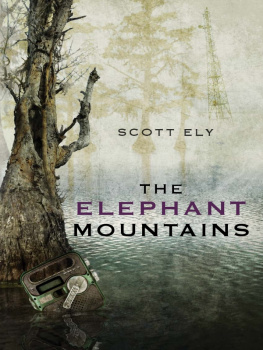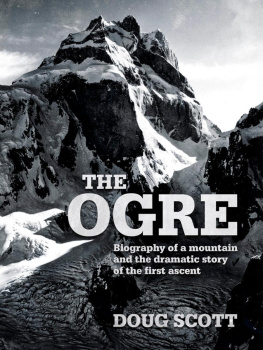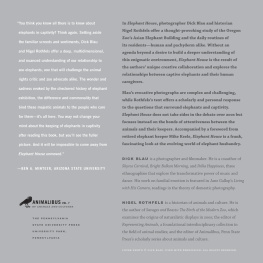Scott Ely - The Elephant Mountains
Here you can read online Scott Ely - The Elephant Mountains full text of the book (entire story) in english for free. Download pdf and epub, get meaning, cover and reviews about this ebook. year: 2011, publisher: Orca Book Publishers, genre: Art. Description of the work, (preface) as well as reviews are available. Best literature library LitArk.com created for fans of good reading and offers a wide selection of genres:
Romance novel
Science fiction
Adventure
Detective
Science
History
Home and family
Prose
Art
Politics
Computer
Non-fiction
Religion
Business
Children
Humor
Choose a favorite category and find really read worthwhile books. Enjoy immersion in the world of imagination, feel the emotions of the characters or learn something new for yourself, make an fascinating discovery.
The Elephant Mountains: summary, description and annotation
We offer to read an annotation, description, summary or preface (depends on what the author of the book "The Elephant Mountains" wrote himself). If you haven't found the necessary information about the book — write in the comments, we will try to find it.
The Elephant Mountains — read online for free the complete book (whole text) full work
Below is the text of the book, divided by pages. System saving the place of the last page read, allows you to conveniently read the book "The Elephant Mountains" online for free, without having to search again every time where you left off. Put a bookmark, and you can go to the page where you finished reading at any time.
Font size:
Interval:
Bookmark:

THE
ELEPHANT
MOUNTAINS
SCOTT ELY
ORCA BOOK PUBLISHERS
Text copyright 2011 Scott Ely
All rights reserved. No part of this publication may be reproduced or transmitted in any form or by any means, electronic or mechanical, including photocopying, recording or by any information storage and retrieval system now known or to be invented, without permission in writing from the publisher.
Library and Archives Canada Cataloguing in Publication
Ely, Scott
The elephant mountains [electronic resource] / Scott Ely.
Electronic monograph in PDF format.
Issued also in print format.
ISBN 978-1-55469-407-5
I. Title.
PZ7.E574EL 2011A J813.54 C2011-903487-5
First published in the United States, 2011
Library of Congress Control Number: 2011929252
Summary: A fifteen-year-old boy and a college girl struggle to survive after a series of hurricanes has flooded the Mississippi delta and anarchy reigns.

Orca Book Publishers is dedicated to preserving the environment and has printed this book on paper certified by the Forest Stewardship Council.
Orca Book Publishers gratefully acknowledges the support for its publishing programs provided by the following agencies: the Government of Canada through the Canada Book Fund and the Canada Council for the Arts, and the Province of British Columbia through the BC Arts Council and the Book Publishing Tax Credit.
Design by Teresa Bubela
Cover artwork by Juliana Kolesova
| ORCA BOOK PUBLISHERS | ORCA BOOK PUBLISHERS |
| PO Box 5626, Stn. B | PO Box 468 |
| Victoria, BC Canada | CUSTER, WA USA |
| V8R 6S4 | 98240-0468 |
www.orcabook.com
Printed and bound in Canada.
14 13 12 11 4 3 2 1
For Susan
Contents
S tephen lay on the cot on the screened porch and looked up at the stars. A mad din of frogs rose from the water only a few yards away, the house set up on pilings against its rise. He never thought frogs could make so much noise. It seemed to him that all the frogs in the world were in the marsh, whose network of channels, like the veins on the back of his fathers hands, stretched away to the big creek that flowed into the Bogue Chitto that flowed into the Pearl that flowed into the Gulf of Mexico perhaps fifty or sixty miles away. The stars, whose names his father had been teaching him, were easy to see because there were no lights. There was a security light up on a pole, but they did not waste generator or solar power on that or on lights in the house. Also they did not want to reveal their presence. He supposed there were lights in New Orleans on the other side of Lake Pontchartrain. That was where his mother lived. Or perhaps she was no longer there? Perhaps she had been evacuated? Perhaps the city was absolutely dark and people were going about the flooded streets in boats and, like him, looking up at the stars?
Stephen was not back in New Orleans because in June a big hurricane had come ashore there. Then a week later another one made landfall not far from the city and, like the first, tracked up into the Mississippi Valley. Simultaneously one was coming ashore in Georgia. Then there were the two, one right after the other, in South Carolina. All made their way inland to areas drained by the Mississippi River. The one in Georgia went all the way to Ohio. The rain fell for weeks from these slow-moving, powerful storms.
The river rose higher and higher, and finally the river control structure failed. It was a dam and spillway system that once kept the Mississippi from entering the Atchafalaya River above New Orleans and creating a new path to the Gulf. Now most of the river flowed through what was once the Atchafalaya. Because of the rains upstream, there was still plenty of river flow past New Orleans and Baton Rouge.
From New Orleans to the high ground near Natchez, everything was underwater. The population had been evacuated. As more water came down the Mississippi from the rains inland, it became less and less likely anyone was going to return soon. The National Guard and the regular army were stretched very thin. Their attention was required for the two wars in Africa and a much larger one in Asia.
Some people stayed. Since the National Guard and the local police had abandoned the little towns, the result was that those stay-behinds did whatever they wished. His father called that anarchy, stealing some gasoline or fresh water from someone and perhaps killing him if you were in the mood. His father liked to say things like that happened routinely in other places in the world, and now Americans were finding out the true nature of human beings. Stephen did not know if that was true. He did not want to believe it.
Stephen kept getting conflicting and wild reports from the various radio stations. One in New Orleans claimed the new levees the Corps of Engineers completed, the ones to replace the levees built years ago in response to the big Hurricane Katrina, were holding and were in absolutely no danger of being overtopped or breaking. Other stations said the levees on the lower Mississippi had been overtopped in many places. Creeks and small rivers that under the levee system did not run directly into the Mississippi now did. As one report put it: Things have been rearranged. One station out of Texas claimed that the whole coastal plain from Texas to South Carolina, including New Orleans, was underwater and was going to stay that way for a long time. Florida had simply vanished beneath the sea, the victim of a series of big hurricanes and sea levels that rose faster than anyone thought possible. The same was true throughout the world. It was also hot, the climate going from temperate to tropical in just a few years.
The station he liked the best was one he could not place geographically. There were no commercials and no call letters, just a voice. The man spoke with a deep Mississippi accent and called himself the Swamp Hog.
Listen, children, listen, the Swamp Hog said. Move inland. This ole hog can live in a swamp but not you.Move to the Himalayas. Move to the Andes. Move to the Rockies. Good Lord, but its turned hot. Soon those mountains will be covered with the thickest jungle youve ever seen. The sea is rising. Get yourself where it cant reach you.
He wanted his father to listen to it, but he was never able to bring the station in when his father was present.
I think youre dreaming that station, his father said.
No, its real, he insisted.
Its the station of anxiety. Everyone has one of those broadcasting twenty-four hours a day. Up in their heads.
He would carefully adjust the dial but was rewarded for his efforts only with static.
They were able to live comfortably. The generator and solar panels kept the freezer going, filled with meat, mostly venison, wild hog and fish. One room in the house was completely filled with steel drums containing rice and beans. When he lived with his mother in New Orleans in the house near Audubon Park, she occasionally referred to his father as that crazy survivalist. But he never thought she really meant those words. She was an impulsive woman, laughing one moment and crying the next. Sometimes he would study the girls at his school to see if any of them showed signs of growing up to be like his mother. It would be good to be able to tell early and avoid them.
His mother and father divorced when he was a baby. Now he was fifteen. His mother had done well as an investment banker in New York. When he turned ten, she retired to New Orleans, where her family had lived for a long time. There were some relatives still about, mostly old people who used canes. The ladies kisses left damp spots on his cheeks from their rubbery lips. They smelled of powder and perfume. The old men offered wrinkled, clawlike hands for him to shake. It was through them that his mother became deeply involved in Mardi Gras. Then she took up designing costumes. A young man of twenty-five or so, who he suspected she did not sleep with in the four-poster bed in the second-floor bedroom, came over regularly throughout the year to look at her sketches.
Next pageFont size:
Interval:
Bookmark:
Similar books «The Elephant Mountains»
Look at similar books to The Elephant Mountains. We have selected literature similar in name and meaning in the hope of providing readers with more options to find new, interesting, not yet read works.
Discussion, reviews of the book The Elephant Mountains and just readers' own opinions. Leave your comments, write what you think about the work, its meaning or the main characters. Specify what exactly you liked and what you didn't like, and why you think so.












